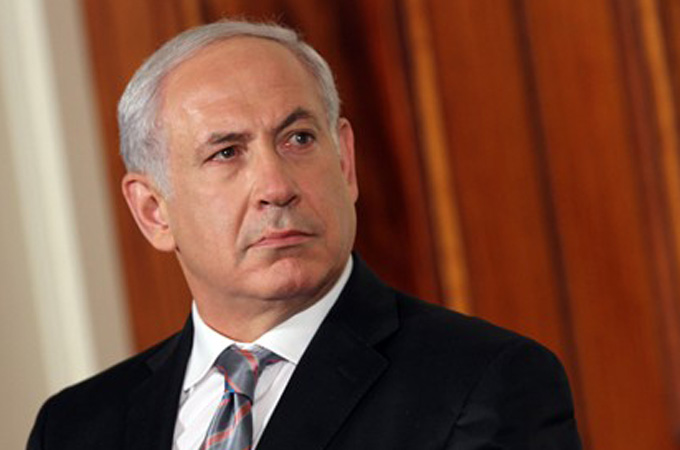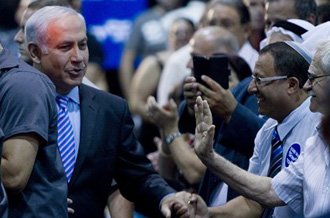Can Netanyahu manage expectations?
Israeli premier’s familiar dilemma: Catering to his right-wing base in Israel at the cost of raising international ire.

 |
| Binyamin Netanyahu, the Israeli prime minister, enters peace talks amid scepticism [AFP] |
Binyamin Netanyahu, Israel’s prime minister, is once again in the position of pledging a commitment to peace with Palestinians while resuming the construction of settlements in disputed territories. The talks, which are dismissed by many as posturing and lauded by few as a sustained challenge of Israel’s policies by the US, are the second round under the Obama administration.
However, it could be said that the first round of talks, held last year, fell apart rather than ended. While Netanyahu instituted a 10-month freeze on the construction of new settlements in East Jerusalem, by March plans for an additional 1,600 new homes were approved in the area, a decision which strained the historically friendly relationship between Israel and the US.
A series of terse responses from Joe Biden, the US vice president, and Hillary Clinton, the US secretary of state, regarding the settlements yielded little – a semi-implemented freeze on the construction of 900 East Jerusalem homes. Forty new units were approved in the Pisgat Zeev settlement in August, in July, 32 units were approved.
The current talks put Netanyahu, who is not known for his soft approach to the issue of new Israeli settlements, in familiar territory. He still requires that Israel control Palestinian air space and borders.
“If the Palestinians recognise Israel as the state of the Jewish people, then we arrive at a solution based on a demilitarised Palestinian state alongside Israel,” said Netanyahu in a policy speech in June of 2009, which brought him as close as he is ever going to come to endorsing a Palestinian state.
“The Palestinian territory will be without arms, will not control air space, will not be able to have arms enter, without the possibility of striking alliances with Iran or Hezbollah.”
 |
| Netanyahu has broad support for his stance on settlements in West Jerusalem [AFP] |
He also maintains that Israelis should be able to live anywhere in Jerusalem. He refuses to talk to Hamas, the ruling party of the Palestinian people. Netanyahu’s positions on these points is secure in Israel, especially after Hamas claimed responsibility for two sets of attacks in the days leading up to the talks – the first killed four Israelis and the second injured two.
Born in Israel, Netanyahu was raised and educated in the US. After completing his compulsory military service in Israel, Netanyahu returned to the US to earn three degrees – two from the Massachusetts Institute of Technology and one from Harvard.
He soon found his place in political life, although his posts placed him once again in the US, as deputy chief of mission at the Israeli embassy and then as the Israeli ambassador to the United Nations, a post he left shortly before joining the right-wing coalition Likud party in 1988.
He is currently in his second term as prime minister, his first beginning in 1996, when he famously instituted a “Policy of Three No’s” – no discussion of Jerusalem, no withdrawal from the Golan Heights and no negotiations with preconditions.
As with any career politician, Netanyahu has experienced his share of setbacks (losing leadership of the Likud party and the premier’s office in 1999), but overall, his profile is that of a survivor. Indeed, so far, the story of Netanyahu’s career is one of ascent even as progress on the Palestinian issue remains imperceptible, regardless of who occupies the job.
However, while facing considerable pressure from Washington to legitimise and accept a Palestinian state and to halt construction of new settlements in East Jerusalem, Netanyahu’s reputation is also subject to harsh criticism within Israel’s own borders.
Despite stating that he would support a demilitarised Palestinian state – though not going as far as to grant such a state full sovereignty and independence – Kadima party opposition leader Tzipi Livni gave voice to what is a common concern among Israelis.
“The prime minister still does not really believe that this is the right path for Israel but he understands that this is the right thing to say,” Livni was quoted as saying in Haaretz. “‘The world is demanding it, so I have to say it.’ This is how Netanyahu explained it to his faction members.”
If or how Netanyahu manages to meet the demands of the world while staying true to his base remains to be seen. But with the US diminishing its presence in Iraq and Iran becoming a stronger player, these talks might be a vital opportunity for Netanyahu to help bring some stability to the region.